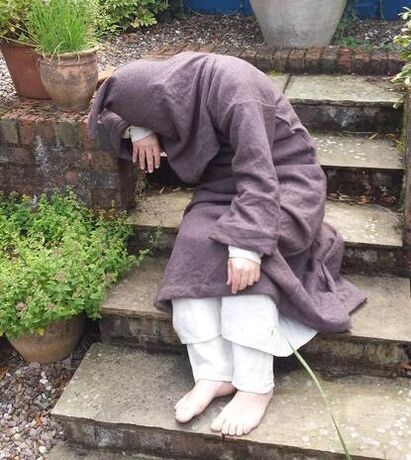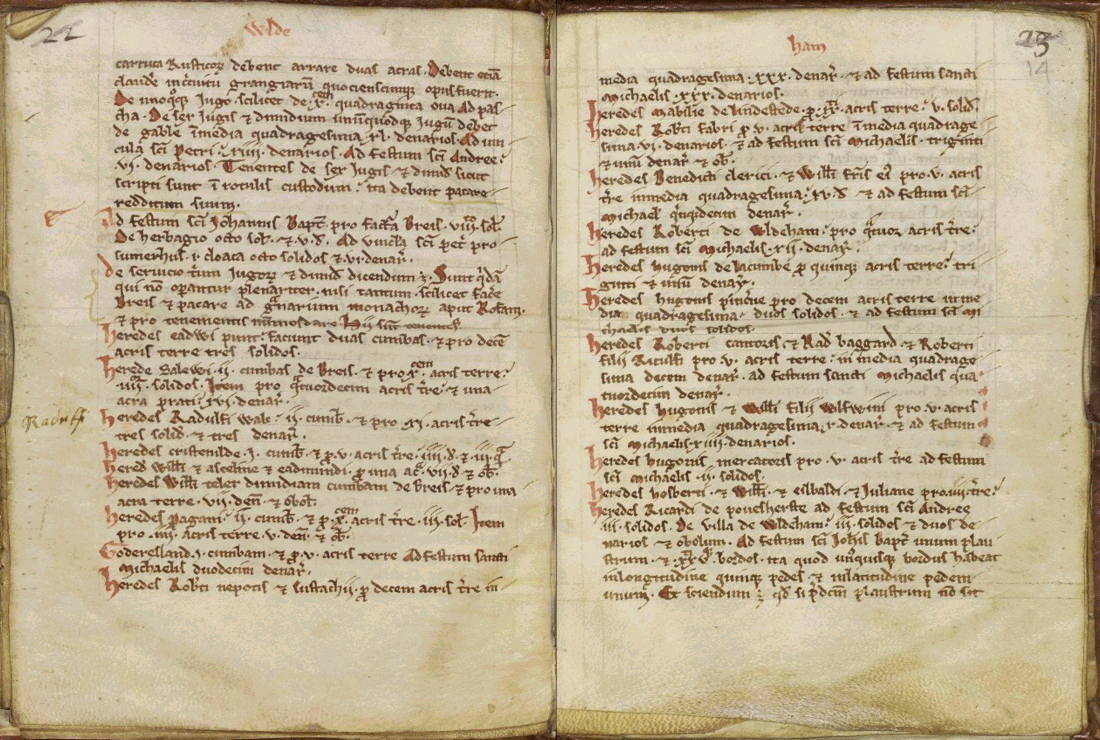|
Hello everyone. In my final research snippet on medieval names, I'm looking at surnames, often referred to as bynames, in the thirteenth-century Custumale Roffense (the Rochester custumal), a survey of tenants and their duties and rents, which was compiled by the monks of St Andrew's Priory in Rochester. In England, the appearance of inherited family names is associated with the post-Conquest period (i.e. after the year 1066). Nicknames, however, were quite common before then, if the Domesday Book is anything to go by. For a wonderful 'top ten' of Old English nicknames of men who were landowners in 1066, I strongly recommend Dr Thijs Porck's blog post on the subject. It would seem there was a penchant for allusions to body parts, including the eyes, nose, feet, and even the testicles! But what of the Rochester custumal? I should say at the outset that the reason bynames were used was, at least in part, to distinguish one Adam (or John, Robert, or William) from the next, especially if they lived near each other. Something as simple as indicating someone's parentage was an obvious thing to do. So we have, for example, in the vill of Denton, Adam son of Solomon (see image above) and Adam son of Lambert (see image below). Almost all the names I've come across so far that are of this kind are patronymic, that is, the father rather than the mother is named as the parent. The one probable exception is a certain Richard, also from Denton, who is named as the son of Sevara (in the manuscript the name appears as Seuare, a feminine genitive form: see image below), which may be an earlier version of the woman's name Savory. It is common for bynames to be geographical, usually in the form of name + location, such as Amabel (Mabel) of Lynsted, Godard of Rochester, and Richard of Poulhurst. Slightly differently, a surname may have indicated one's heritage: so Ralph Wale's surname may indicate he had a Welsh ancestry. Slightly more fun among the geographical bynames are those alluding to a feature of the landscape, such as Hugh de la Cumbe (Anglo-Norman for 'of the valley') and Adam de la Helde ('of the slope/hill': see helde in the Middle English Dictionary). I have not come across many nicknames comparable to those of the Anglo-Saxons in the Domesday Book, mentioned above. The only two so far are Hugh the Red (Latin, Rufus, see image above), who perhaps had a ruddy complexion or red hair, and Elword 'the Angry' (Old English weamod, see image below), of whom, I believe, I would have stayed clear in the local thirteenth-century alehouse. Very common bynames in the Rochester custumal are those related to occupations. Strictly speaking, it is often quite difficult to know if the compiler is referring to the present occupation of the named individual or to an inherited surname derived from the occupation of an ancestor of that individual. For example, was Osmund simply 'the cooper' (Latin cuparius) rather than Osmund Cooper? These names are usually written in Latin (or are Latinised). My understanding is that though some Latin forms have subsequently become English family names, it is generally better to translate them into their English equivalents, though I wouldn't wish to be dogmatic about this. So, for example, Latin Faber is the common surname Smith. Here are some more occupational surnames from Custumale Roffense: Butler (Latin pincerna), Cardinal (Latin cardinalis), Chaplin (Latin capellana), Clerk (Latin clericus), Merchant (Latin mercator), Singer (Latin cantor), Tailor (Latin parmenter), and Weaver (Latin telarius). And so, to my three favourite bynames discovered so far in my research, none of which are easy to categorise along the lines described above. First is Punt, belonging to a fellow called Edwy (see image above). This surname is suggestive of a connection to boats, as Old English punt, which derives from Latin ponto, means a flat-bottomed boat or ferry. Was Edwy, or his ancestor, a ferryman? Second is Pudding, a surname owned by a chap called Geoffrey (see image below), who is listed as one of the jurors of Darenth. I love the idea of Geoffrey's ancestors being pudding makers, but I suspect the name has a somewhat different derivation. And, finally, a byname for which I have even fewer clues to its origin and meaning: Baggard. This surname belonged to a certain Ralph from the vill of Wouldham (see image below). So if any of you have any clues, or if you yourself are named Baggard, do let me know. Apparently, it has not survived as an English or Irish family name (according to the Oxford Dictionary of Family Names in Britain and Ireland), so if you are a Baggard, you're very special indeed. For more research snippets on medieval names, click on the links below:
6 Comments
Love this! Question(s) for you: How do you get "Geoffrey" out of Mr. Pudding's first name as written, or "Ralph" out of Mr. Baggard's? Or, for that matter, Hugh the Red's first name looks NOTHING like "Hugh" to me.
Reply
Christopher Monk
26/11/2018 05:07:04 pm
Good question(s)!
Reply
Christopher Monk
26/11/2018 05:35:45 pm
No, Godfrey is a different name, though the two are often confused. From OE *god* ('God') + Old High German *fridu* ('peace').
Reply
Christopher Monk
27/11/2018 08:32:18 am
Kay, I know what you mean! Linguistics is something I've not studied in great depth but when I do engage with linguistic studies, it appeals to the nerdy side of me (no offence, linguistics people). Your comment will be posted after it is approved.
Leave a Reply. |
Details
|











